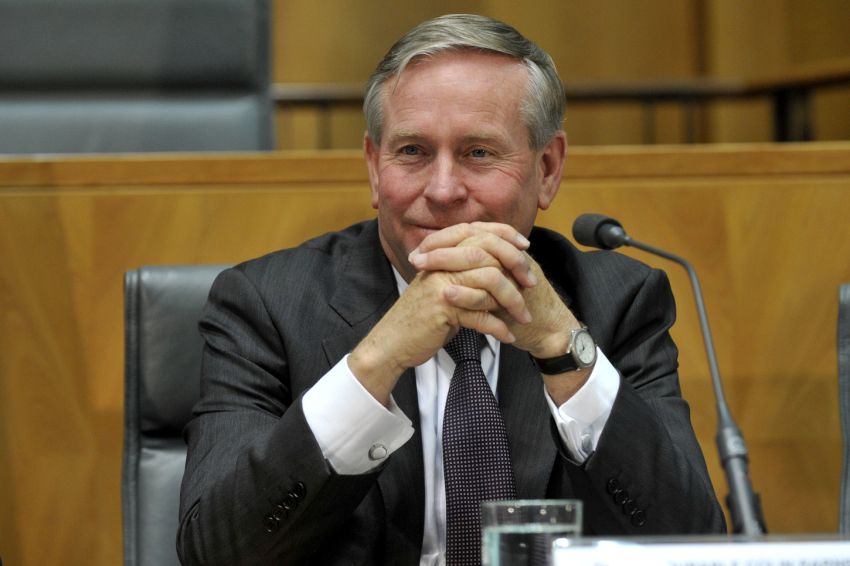
Western Australia Premier Colin Barnett and Local Government Minister Tony Simpson unveiled the state's worst-kept secret on July 30, when they announced their plan to slash the number of councils in Perth from 30 to 14.
Buoyed by the two-thirds parliamentary majority the conservative parties gained in the March 9 state election, they junked the explicit pre-election promise they made that there would be no forced council amalgamations. The move rescinds the provision that allows a council to refuse a merger if it has been rejected by a majority of residents in a referendum.
Barnett's sales pitch is that bigger councils will have economies of scale that deliver better services and lower rates. However, the experience of forced council amalgamations in Victoria by the Jeff Kennett government in the 1990s contradicts this claim.
Ironically, the Barnett government tried last year to force the closure of the Southern Metropolitan Councils Resource Recovery Centre, a multi-council combined composting and recycling enterprise.
This would have pushed an extra 60,000 tonnes of waste into landfill and 70,000 tonnes of CO2 into the atmosphere every year. It would have enabled the state to charge the councils involved $1.5 million in landfill levies and destroy a $100 million community asset in the process.
Predictably, big business and developer organisations have welcomed the government announcement and the promise that it will deliver “greater consistency” in planning.
Typical was the Committee for Perth — a big business lobby group backed by big oil and gas companies, Alcoa and The West Australian — which praised the Barnett government for faithfully following its prescriptions.
The change would bring a drastic reduction in democratic representation. Among the amalgamations Barnett’s government is proposing is the merger of Fremantle, East Fremantle and Melville councils. Melville has 100,000 residents but only nine elected councillors. This is the government's preferred number, whereas Fremantle’s 30,000 people have 13 councillors including the mayor.
Fremantle councillor and Socialist Alliance member Sam Wainwright said: “If we are forcibly merged with Melville it will create a council with around 140,000 residents and perhaps only nine elected councillors. What we now think of as Fremantle and East Fremantle would only qualify for one-and-a-half councillors on the new body.
“It would create council wards that are bigger than state electorates. One thing's for sure, as the new councils would have to pay their councillors serious money this in turn would mean it would be very hard to get elected without serious financial or major party backing.”
Democratic community control over planning has already been substantially reduced in WA. In 2011, the Barnett government introduced Development Assessment Panels (DAPs), to which all developments over $7 million have to be referred.
Most DAPs consist of unelected appointees, sometimes with little planning expertise, who outnumber the two elected representatives from the relevant council. For developments between $3 million and $7 million, developers have the option of going to council or the DAP for approval. Most prefer the DAP route.
Wainwright said: “The DAPs are bad enough already. Basically the state government is happy for elected councillors to take on the work and grief, mostly unpaid, that goes with adjudicating the myriad of smaller planning applications. But as soon as it comes to anything really significant, democracy goes in the bin.”
In anticipation of the state government's proposal, the City of Fremantle conducted an extensive survey of its residents. This indicated that 75% of residents were opposed to being swallowed up by Melville and 70% were opposed to change being imposed without a vote, the very two things now being proposed.
“The survey showed residents were open to the idea of creating a greater Fremantle council, absorbing some of its natural hinterland,” Wainwright said. “But the lines the government have drawn on the map don't correspond to social and economic communities of interest, they cut across them.”
Fremantle opposes the proposed Roe 8 freeway through the Beeliar wetlands, was the first metropolitan council to join the Wheatbelt Railway Retention Alliance in opposition to the closure of country railway lines, supports the campaign for a community owned wind farm and hosted the 20,000 strong Concert for the Kimberly. Is it on the state government's hit list?
“Some of the proposed boundaries were clearly prepared on the back of an envelope in about five minutes,” Wainwright said. “It's hard to know if it's just a rush job or if there's a bit of Machiavellian bastardry thrown in there too.
“I expect [Fremantle council] will make a formal submission that again makes the case for a greater Fremantle based on real communities of interest. But if the state refuses to budge then we'll need an outpouring of people power. The bottom line is there should be no forced amalgamations. That's what the government promised, and 70% of our residents have said they want to vote on any change.”